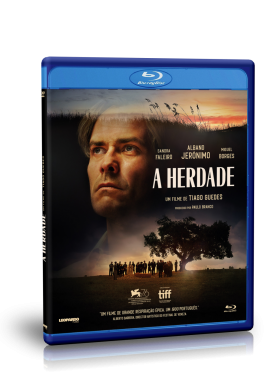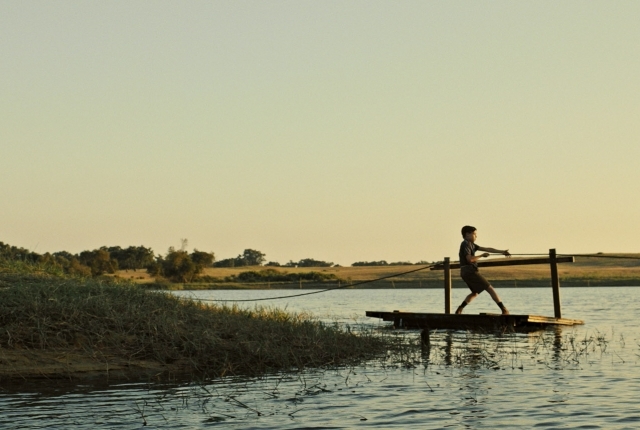The Domain A Herdade
The chronicle of a family that owns one of the largest estates in Europe, on the south bank of the River Tagus. The Domain delves deeply into the secrets of their homestead, portraying the historical, political, economic and social life of Portugal, since the 1940s, through the Carnation Revolution to these days.
Festivals and awards
Venice Film Festival 2019
Official Selection - In Competition
Bisato d’Oro Award for the Best Director
Toronto International Film Festival 2019
Official Selection - Special Presentations
Oscars 2020
Portuguese candidate for a nomination in the Best International Film category
Goya Awards 2020
Portuguese candidate for a nomination in the Best Ibero-american Film category
Golden Globes 2021 - Winner:
- Best Film
- Best Actor - Albano Jerónimo
Sophia Awards 2020 - Portuguese Academy of Cinema - Winner:
- Best Film
- Best Director - Tiago Guedes
- Best Actress (main role) - Sandra Faleiro
- Best Actress (supporting role) - Ana Vilela da Costa
- Best Original Screenplay - Rui Cardoso Martins e Tiago Guedes
- Best Cinematography - João Lança Morais
- Best Film Editing - Roberto Perpignani
33rd Panorama of European Cinema (Greece)
Best Film Award
Waterloo Historical Film Festival
Best Actress Award - Sandra Faleiro
34º Mostra deValència
Göteborg Film Festival 2020
Dublin Film Festival 2020
25th Vilnius International Film Festival Kino Pavasaris
Festival Internacional del Nuevo Cine Latinoamericano de La Habana
Minsk International Film Festival Listapad
Tallin Black Night Film Festival - PÖFF
Macau Film Festival
La Habana Film Festival
European Union Showcase a Washington DC
IFFI - International Film Festival of India (Goa) - Official Selection
Mostra Internacional de Cinema de São Paulo 2020
Selecção Oficial
Reviews
«Remarkable portrait of a patriarchal fiefdom gradually being eaten away from both outside and in.»
Lee Marshall, Screen Internacional
«A torrential film. An ambitious oeuvre.»
Andrea Chimento, Il Sole 24 Ore
«João Lança Morais’s cinematography has an undeniable formal beauty.»
Jay Weissberg, Variety
«A Herdade is an artistic victory, while looking in eyes the audience.»
Pedro Marta Santos, Revista Sábado
«[Tiago] Guedes finds precisely the right tone for the material, which is slightly starker than pure realism. It lifts the clan and its troubles from their everyday plane into the realm of something more timeless and almost mythical, much like [Eça] Queiroz»
Boyd van Hoeij, The Hollywood Reporter
«An extraordinary saga by Tiago Guedes.»
João Barrento, Jornal de Letras, Artes e Ideias
«A great tittle of the Competition (…) It is extraordinary to see [Tiago] Guedes' film at its exponential 164-minute length, all at once, immersed in the immensity of the silent and wonderful nature, suspended in the fluctuation of time.»
Davide Turrini, Il Fatto Quotidiano
«Portuguese cinema proves that it is very much alive, in the endless process of resistance that it has been distinguished for.»
Eduardo Dâmaso, Sábado
Cast and crew
Albano Jerónimo, João Fernandes
Sandra Faleiro, Leonor
Miguel Borges, Joaquim Correia
João Vicente, Leonel Sousa
João Pedro Mamede, Miguel
Ana Vilela da Costa, Rosa
Rodrigo Tomás, António
Beatriz Brás, Teresa
Teresa Madruga, Guilhermina
Diogo Dória, General Lopo Teixeira
Ana Bustorff, Isabel Lopo Teixeira
Victoria Guerra, Catarina Lopo Teixeira
Álvaro Correia, Minister
Cândido Ferreira, Priest Heitor
António Simão, Inspector Cravo
Tonan Quito, Vítor Fonseca
Fernando Rodrigues, João Fernandes' father
Américo Silva, Unionist 1
Dinis Gomes, GNR Manuel
Jorge Loureiro, GNR Aurélio
Catarina Rôlo Salgueiro, Maria de Fátima
Jorge Mota, Doctor Marques
Marco Paiva, Chief of Staff
João Arrais, Joaquim (Young)
Filipe Vargas, Ricardo Lopo Teixeira
Marcello Urgeghe, Fernando Melo e Sá
Gabriel Timóteo, Miguel (Child)
Eduardo Aguilar, João Fernandes (Child)
Directed by Tiago Guedes
Screenplay: Rui Cardoso Martins and Tiago Guedes
with the collaboration of Gilles Taurand
Cinematography: João Lança Morais
Film editing: Roberto Perpignani
Art direction: Isabel Branco
Sound: Francisco Veloso, Elsa Ferreira and Pedro Góis
Costumes: Isabel Branco and Inês Mata
Assistant directors: Paulo Mil Homens
António Pinhão Botelho and Ana Mariz
Makeup: Íris Peleira
Producer: Paulo Branco
Co-producer: Carlos Bedran
A Leopardo Filmes
and Alfama Films Production co-production
In association with CB Partners and Ana Pinhão Moura Produções
With the support of ICA - Instituto do Cinema e Audiovisual
Fundo de Apoio ao Turismo e Cinema
and RTP - Rádio e Televisão de Portugal
International sales and festivals: Alfama Films
Director's biography
Tiago Guedes graduated in Filmmaking from the New York Film Academy. He attended the Directing of Actors course with Patrick Tucker, at Raindance London. He developed several projects for television and cinema, and he directed several television series, television films and feature films of great success within the audiences.
His first feature film, “Blood Curse” (2005), codirected with Frederico Serra, was part of the official selection of festivals such as Hamburg International Short Film festival, Sitges Film Festival and Busan, the most important film festival of Asian cinema. “Blood Curse” was also at Turim Film Festival, amongst other genre festivals. In Portugal, “Blood Curse” was the opening film at Fantasporto 2006, whilst part of the Competition. The film was released on DVD in Spain, France and USA.
The feature film “Noise” (2008), also codirected with Frederico Serra, was selected for several international film festivals, such as the Official Competition at San Sebastián Film Festival - section “Zabaltegi-Tabakalera”; the Official Selection at the Cartagena International Film Festival, awarded with the Best First Work Prize and the Best Actor Prize; the Turim Film Festival – Official Selection, winner of the Ciputti Prize for Best Film; and São Paulo International Film Festival, amongst others.
“The Domain” (2019) is his most ambitious project, whose script was written in collaboration with Rui Cardoso Martins.
Intentions note
The Burden of Heritage
What makes us who we are?
The choices and options we take throughout life define us, but we carry on with us matters we don’t understand neither control. Something that makes us be and act, something that was born with us, and that was passed on to us, something we inherited. This film is about those invisible ties that define us and limit our behaviour.
The scenery of the film works almost as a metaphor for everything that happens to the protagonist, a charismatic man, one of those who are bigger than life. Both man and land are grand and imperial at the beginning, but as the events take place, they start to reveal their imperfections, their grey zones, and both start to collapse.
The Domain is kind of a huge isle inside a country dominated by a fascist dictatorship. It’s like a kingdom dominated by a progressive and a charismatic anarchist prince. But he will inevitably collide with the people’s will to change. A collision with the changes of history, with the passage of time. I actually do want to film these human and territorial transformations. Its consequences.
The landscape of The Domain will be the discovery of the immense marshlands and latifundia of Tagus’ south bank. A singular view: the earthy hill, the barns, the cornfields, the horses, the lakes in the sun will be the historical, political, financial stage of Portugal in the last 60 years, going through the Carnation Revolution (25th April 1974). They will also be the space of the obscure actions of the film characters consumed by their torments, social biases, greed, love and mismatches.
The universe of The Domain sends us back to several films I deeply love. Films of open spaces, westerns lost in the middle of nowhere with enigmatic characters who carry secrets, as in Leone’s and Anthony Mann’s films. At the same time, human relationships are explored in a way that is similar to the melodramas of Minelli and Kazan’s classic films.
A film of strong characters, great actors, strong interpretations, and the greatness of the landscapes that envelop them, and the consequences of the secrets they carry. The heritage left to us and the heritage we leave to others.
Tiago Guedes












































